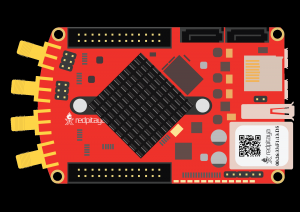2.3.6.8.6. UART
2.3.6.8.6.1. Description
This example demonstrates communication using the Red Pitaya UART protocol. The code below simulates a loopback by sending a message from the UART TX connector to the UART RX connector on the Red Pitaya.
Note
When establishing UART communication with Red Pitaya and another device do not forget to connect the External Common Mode (GND) pin. Otherwise, the results might be unreliable.
2.3.6.8.6.3. Code - C
Note
Although the C code examples don’t require the use of the SCPI server, we have included them here to demonstrate how the same functionality can be achieved with different programming languages. Instructions on how to compile the code are here.
/* @brief This is a simple application for testing UART communication on a RedPitaya
* @Author Luka Golinar <luka.golinar@redpitaya.com>
*
* (c) Red Pitaya http://www.redpitaya.com
*
* This part of code is written in C programming language.
* Please visit http://en.wikipedia.org/wiki/C_(programming_language)
* for more details on the language used herein.
*/
#include <stdio.h>
#include <stdlib.h>
#include <string.h>
#include <unistd.h> //Used for UART
#include <fcntl.h> //Used for UART
#include <termios.h> //Used for UART
#include <errno.h>
/* Inline function definition */
static int uart_init();
static int release();
static int uart_read(int size);
static int uart_write();
/* File descriptor definition */
int uart_fd = -1;
static int uart_init(){
uart_fd = open("/dev/ttyPS1", O_RDWR | O_NOCTTY | O_NDELAY);
if(uart_fd == -1){
fprintf(stderr, "Failed to open uart.\n");
return -1;
}
struct termios settings;
tcgetattr(uart_fd, &settings);
/* CONFIGURE THE UART
* The flags (defined in /usr/include/termios.h - see http://pubs.opengroup.org/onlinepubs/007908799/xsh/termios.h.html):
* Baud rate:- B1200, B2400, B4800, B9600, B19200, B38400, B57600, B115200, B230400, B460800, B500000, B576000, B921600, B1000000, B1152000, B1500000, B2000000, B2500000, B3000000, B3500000, B4000000
* CSIZE:- CS5, CS6, CS7, CS8
* CLOCAL - Ignore modem status lines
* CREAD - Enable receiver
* IGNPAR = Ignore characters with parity errors
* ICRNL - Map CR to NL on input (Use for ASCII comms where you want to auto correct end of line characters - don't use for bianry comms!)
* PARENB - Parity enable
* PARODD - Odd parity (else even) */
/* Set baud rate - default set to 9600Hz */
speed_t baud_rate = B9600;
/* Baud rate fuctions
* cfsetospeed - Set output speed
* cfsetispeed - Set input speed
* cfsetspeed - Set both output and input speed */
cfsetspeed(&settings, baud_rate);
settings.c_cflag &= ~PARENB; /* no parity */
settings.c_cflag &= ~CSTOPB; /* 1 stop bit */
settings.c_cflag &= ~CSIZE;
settings.c_cflag |= CS8 | CLOCAL; /* 8 bits */
settings.c_lflag = ICANON; /* canonical mode */
settings.c_oflag &= ~OPOST; /* raw output */
/* Setting attributes */
tcflush(uart_fd, TCIFLUSH);
tcsetattr(uart_fd, TCSANOW, &settings);
return 0;
}
static int uart_read(int size){
/* Read some sample data from RX UART */
/* Don't block serial read */
fcntl(uart_fd, F_SETFL, FNDELAY);
while(1){
if(uart_fd == -1){
fprintf(stderr, "Failed to read from UART.\n");
return -1;
}
unsigned char rx_buffer[size];
int rx_length = read(uart_fd, (void*)rx_buffer, size);
if (rx_length < 0){
/* No data yet avaliable, check again */
if(errno == EAGAIN){
fprintf(stderr, "AGAIN!\n");
continue;
/* Error differs */
}else{
fprintf(stderr, "Error!\n");
return -1;
}
}else if (rx_length == 0){
fprintf(stderr, "No data waiting\n");
/* Print data and exit while loop */
}else{
rx_buffer[rx_length] = '\0';
printf("%i bytes read : %s\n", rx_length, rx_buffer);
break;
}
}
return 0;
}
static int uart_write(char *data){
/* Write some sample data into UART */
/* ----- TX BYTES ----- */
int msg_len = strlen(data);
int count = 0;
char tx_buffer[msg_len+1];
strncpy(tx_buffer, data, msg_len);
tx_buffer[msg_len++] = 0x0a; //New line numerical value
if(uart_fd != -1){
count = write(uart_fd, &tx_buffer, (msg_len));
}
if(count < 0){
fprintf(stderr, "UART TX error.\n");
return -1;
}
return 0;
}
static int release(){
tcflush(uart_fd, TCIFLUSH);
close(uart_fd);
return 0;
}
int main(int argc, char *argv[]){
char *data = "HELLO WOLRD!";
/* uart init */
if(uart_init() < 0){
printf("Uart init error.\n");
return -1;
}
/* Sample write */
if(uart_write(data) < 0){
printf("Uart write error\n");
return -1;
}
/* Sample read */
if(uart_read(strlen(data)) < 0){
printf("Uart read error\n");
return -1;
}
/* CLOSING UART */
release();
return 0;
}
